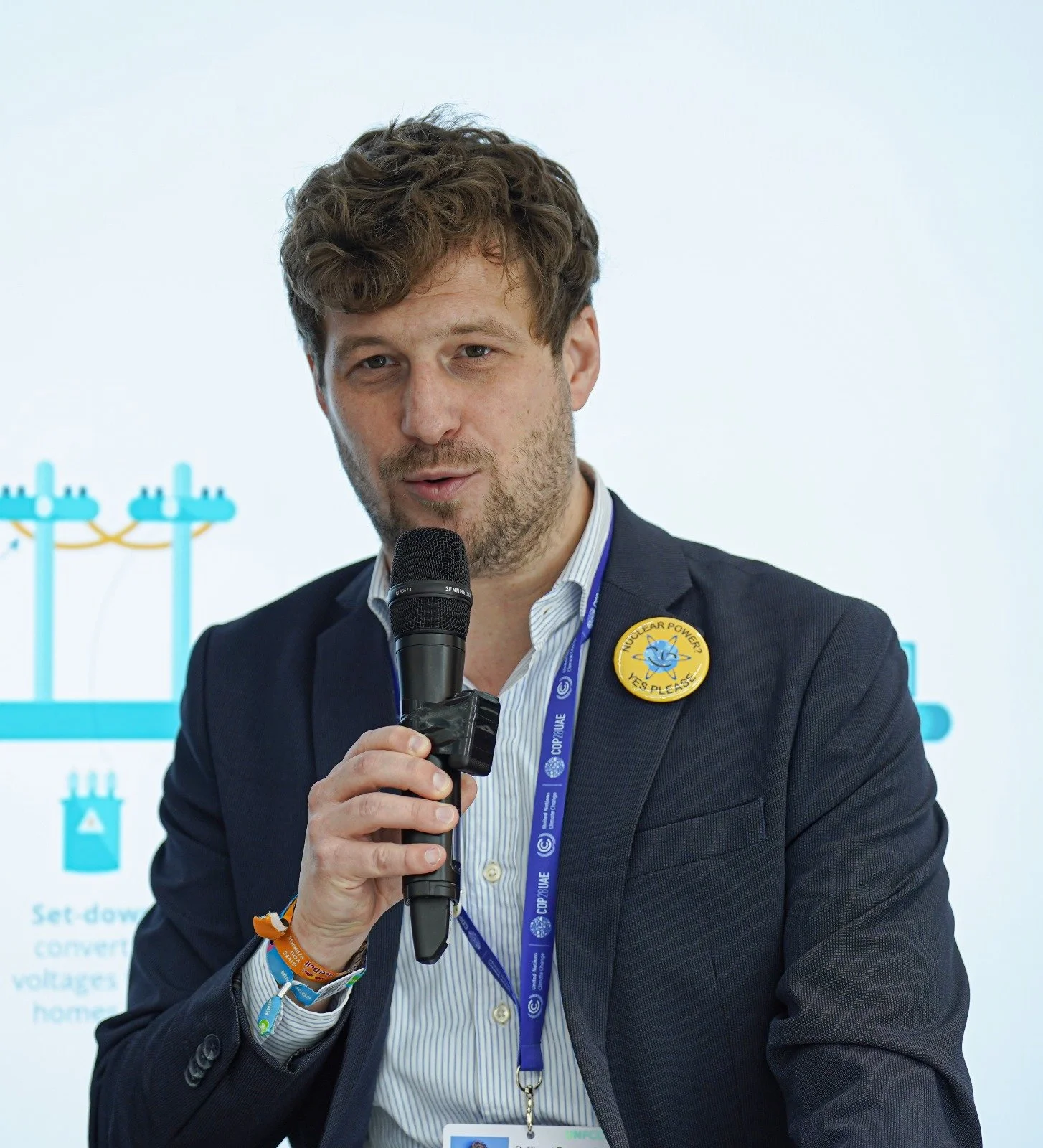Emeric Massaut, Belgian Railroad Engineer, Recreational Glider, Nuclear Advocate
Meet the Belgian railroad engineer who takes to the skies in a glider and champions nuclear energy on the ground.
Massaut speaking on nuclear as part of the Net Zero Initiative at COP 28 in the UAE.
Emeric Massaut engineers the infrastructure for the Belgian railroad, and advocates for nuclear energy across Europe through panel discussions, speeches, and as vice-president of Volt Belgium, the national chapter of the pan-European centrist political party with progressive values.
Massaut said he always was interested in technical applications and technology, which led him to study aerospace engineering in the United Kingdom. When he returned to Belgium, Massaut worked for an appliance and electronics manufacturing company and a R&D engineering company before joining the Belgian railways.
Massaut’s father, a long time worker at the Belgian Nuclear Research Centre (SCK-CEN), exposed Massaut to nuclear energy at a young age giving him a foundational knowledge.
Although Massaut remained conscious of nuclear energy for years, and recognized the tsunami at Fukushima was much more destructive than the nuclear accident, it was not until 2020 that he became inspired to become an activist.
“I've realized that nuclear is actually a taboo. It's something you don't talk about,” Massaut said. “The advocacy in me really grew into I need to fight for this because it [shouldn’t be] just an accepted fact that we should just phase it out, because it's the law. When I realized that Volt is a political movement. It's where you start to fight for ideas and advocate for [what you care about].”
Around this time, Massaut also discovered Stand Up for Nuclear Belgium, a group actively fighting against the planned reactor closures. Stand Up sponsored a demonstration in 2019, two demonstrations in 2021, a protest in 2022 of Doel 3’s closure, a protest in 2023 commemorating Tihange 2’s closure, and a protest in 2025 lamenting the loss of Doel 1 and Massaut played key roles in the protests.
Massaut passionately addressed and motivated the crowd at a Stand Up for Nuclear event in Brussels in 2021.
With the recent closure of Doel 1, Belgium now operates Doel 2, Doel 4, Tihange 1, and Tihange 3. The four reactors have a combined capacity of 3,463 MWe. The two newest plants Doel 4 and Tihange 3, were given 10 year extensions, and are set to close in 2035. Massaut hopes to save Belgium’s four remaining reactors from premature closure.
“What I hope is that we, as advocates and together with civil society and other actors in the industrial world, to try and push a huge engagement from all parts of Belgium society to say, “No, we need to keep all the reactors that we have,” Massaut said. “I really hope that we can convince all actors in this field that it's crucial for our energy security, for our energy independence and for the price of energy in general, to keep all these reactors open and to even reopen the ones that have already been shut down.”
Especially proud of the Tihange 2 demonstration, which received significant press coverage, Massaut said that the Belgian activists have successfully shifted the narrative on nuclear, letting the public know people care about the energy source.
According to Massaut, most Belgians are aware that nuclear is a part of the energy mix, and that it provided around 50% of electricity generation. Recent polls have shown an uptick in support for nuclear, linked to an opposition to expensive, CO2 emitting nautral gas (substantially provided by Russia); a majority of people are in favor of keeping the nuclear plants operating.
Massaut said he is hopeful advocates can capitalize the change in attitude toward nuclear to stop the phaseout. Politically, most parties have shifted to become pro-nuclear, with the most important exception of the Greens.
While optimistic about public support for nuclear, the financial system set up for decomissioning worries Massaut, and he fears they may only be able to save two or three of the seven reactors.
The operator has a financial incentive to proceed with decommissioning because the decommissioning fund—reserved by the operator but controlled by the government—allows them to keep any leftover funds if the process costs less than expected.
This creates an environment where once a reactor is shut down, it is unlikely to be restarted, as there is more motivation to complete decommissioning than to invest in reactivating the plant.
Massaut views nuclear as the latest evolution in human technological development and advancement in a world where energy is a crucial part of day to day life. The capacity to heat water and make electricity, unlocked in the 1950s, marked a major milestone, utilizing the most energy dense fuel available.
“Our world is fueled by energy. Nuclear energy is really at the pinnacle of human advancement,” Massaut said. “It can make us into [a] better society, clean[er] and more prosperous.”
An essential part of a clean future relies on carbon-free transportation. Massaut is proud to work at the Infrabel, a Belgian railway company because their network is almost entirely electrified, running on a substantial portion of nuclear energy.
Massaut also studied astronautics and envisions nuclear technology playing a greater and greater role in outer space applications. Already, Voyager One and Voyager Two are powered by Radio Thermal Generators (RTGS), a plutonium-based radioactive battery. Massaut added that bases on the moon or Mars cannot rely on solar because they experience several days of eclipse at a time. Intergalactic moves will require nuclear energy to power electric propulsion methods, as well.
Massaut speaking with the media as part of a demonstration at the Nuclear Summit in Brussels in 2024.
One of Massaut’s most ambitious ideas to defend nuclear in Belgium is to incorporate protections into their Constitution. If the legislature in this moment could achieve such a feat, Massaut believes it would be “nearly impossible” to ever have a nuclear phase-out law in the future. By 2029, revisions and amendments must pass.
“There's such a great movement inside politics in favor of nuclear power that it [could reach the] 2/3 majority vote [needed] for amending our Constitution,” Massaut said. “I think we need to dare to say that [the] nuclear utility economy needs to be semi-public so that the government has not only a say in it but a stake in it, which means that there are some consequences for the government if they want to do some negative stuff with the asset they own.”
Massaut hopes to play an integral role in these legal discussions which can revive Belgium’s nuclear industry.
Over the years, Massaut has joined the fight for nuclear internationally, attending Stand Up events in Germany and Portugal, where he delivered speeches on the Belgian nuclear situation. In many ways, Germany, a cradle of anti-nuclearism already witnessing the economic and environmental impacts of shutting down their entire nuclear fleet, shows the worst-case scenario for Belgium. Still, Massaut has hope.
“It's baked in since a young age in school [in Germany], that nuclear is bad and dangerous, and that living next to a power plants makes half of the children grow with the third arm or an ear at the back of their head or something. t's baked into nearly every German that has been born since the 80s,” Massaut said. “If Germany can show the world that they can reopen a reactor after shutdown of the entire fleet, that would be something close to a miracle, in my opinion. And if that happens, I think nuclear is saved.
Reimagining how we talk about nuclear energy will be critical to its success moving forward, Massaut said.
“There's nothing worse for nuclear than big taboo,” Massaut said. “The nail in the coffin of nuclear power in the West is that for too long, it was taboo to talk about, to dare to talk [about] nuclear.”



